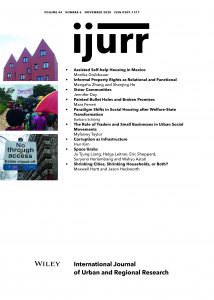This article examines forms of housing finance that offer poor households opportunities for sourcing resources for construction work through non‐mortgage microloans. In Mexico, these housing microfinance schemes have recently been incorporated into national housing policies. On a global level, the past 10 to 15 years have seen the emergence of institutional investment in microfinance. I reflect on these processes in this article by bringing critical accounts of financial inclusion in development studies and the debate on financialization within urban studies and beyond into dialogue. I combine micro‐ and macro‐scale perspectives to examine how households become financial clients and how finance gains influence by expanding capitalist markets into the informal housing sector. This discussion is based on policy review and document analyses and an empirically grounded account of an assisted self‐help housing case study. In the article I draw on three focal concepts—risk, debt and marketization—to highlight the ambivalences of the expanded access to finance for poor households engaged in self‐organized building practices. These ambivalences emerge from the multiplicity of operational logics and motivations in the field of housing provision for the poor, and the profoundly conflicting rationalities of financial‐ and social‐sector actors.

